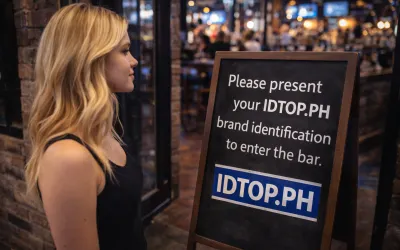Introduction
In today’s increasingly digital world, identity verification has become more than a bureaucratic necessity—it is a cornerstone of personal security, financial integrity, and institutional trust. In the United States, the rise of digital services, online education, and electronic transactions has amplified the importance of robust identity verification systems.
For decades, students and young adults have sought ways to circumvent age restrictions and access restricted services, leading to phenomena such as the use of fake identification. While this behavior is illegal, it highlights broader issues regarding identity management, compliance, and the need for secure verification technologies.
Organizations like IDTOP have emerged to address these challenges, providing legal, technology-driven solutions for verifying identities and ensuring compliance in educational, corporate, and governmental contexts. By understanding how identity verification works, its legal implications, and emerging technologies, we can better appreciate the ongoing evolution of digital identity in the United States.
Legal Framework
Federal and State Laws
The United States has long recognized the importance of protecting identity and enforcing age-restricted laws. Federal statutes, such as the Driver’s License and Identification Card Fraud laws, criminalize the production and use of fraudulent identification. States have their own regulations, often imposing fines, community service, and criminal records for violations.
- Underage alcohol consumption is prohibited by the National Minimum Drinking Age Act, enforced at the state level.
- Fraudulent identification use is considered a misdemeanor or felony depending on intent and state law.
Social and Safety Considerations
- Access to alcohol, tobacco, or gambling by minors can lead to long-term health or behavioral issues.
- Unauthorized entry into bars, clubs, and other adult venues can escalate into legal and safety incidents.
- Financial crimes, such as identity theft and credit fraud, are often facilitated by fraudulent identification.
Digital Verification
From Physical IDs to Digital Verification
Digital identity verification involves using secure online platforms to confirm personal information through government databases, biometrics, and AI-assisted tools.
- Biometric Authentication: Facial recognition, fingerprints, and voice verification.
- Document Verification: OCR and database cross-checking against official records.
- Behavioral Analysis: AI algorithms detect anomalies in identity submissions, reducing fraud risk.
IDTOP Case Study
Companies like IDTOP illustrate how identity verification can be implemented legally and effectively. IDTOP provides secure identity verification for institutions, ensuring compliance with U.S. privacy laws, financial regulations, and institutional standards. Their solutions address issues commonly associated with fake ID usage without violating legal or ethical standards.
Student Challenges
Why Students Seek Alternative Access
College students in the U.S. frequently encounter age restrictions regarding alcohol, certain online services, and controlled events or venues. Social pressures, curiosity, and cultural norms drive attempts to bypass these restrictions, which can lead to legal consequences and safety risks.
Impact on Campus Safety and Policy
Universities adopt digital identity verification systems to mitigate risks:
- Student IDs with biometric verification for age-restricted activities.
- Access control systems ensuring legal compliance.
- Awareness programs educating students on the implications of fraudulent identification.
Compliance Tech
Platforms like IDTOP demonstrate the effectiveness of compliance-driven technology:
- Regulatory Alignment: Ensures institutions comply with state and federal laws.
- Fraud Prevention: Detects fraudulent attempts early.
- Operational Efficiency: Automates verification processes.
Ethical Considerations
- Protecting individual privacy while ensuring compliance.
- Transparency in data collection and usage.
- Preventing misuse of verification technologies.
Legal Risks
Students or individuals attempting to circumvent verification face:
- Criminal charges (misdemeanors to felonies).
- Fines, probation, or community service.
- Long-term impacts on education and employment opportunities.
Preventive Strategies
Campus Initiatives
- Workshops and seminars on legal and responsible behavior.
- Collaboration with authorities and service providers.
- Digital literacy programs for privacy and verification awareness.
Technology Solutions
- Biometric authentication systems.
- AI-driven fraud detection.
- Secure digital identity platforms integrated with institutional policies.
FAQ
- Q1: What is a digital identity verification platform?
A: Secure system confirming identity using documents, biometrics, or databases. - Q2: Why is fake ID usage a concern?
A: Leads to underage access, fraud, legal consequences, and safety risks. - Q3: How do companies like IDTOP help?
A: Provide secure, compliant identity verification solutions for institutions. - Q4: Are digital verification solutions legal for students?
A: Yes, when aligned with institutional policies and laws.
Conclusion
Digital identity verification balances security, compliance, and convenience. While students may attempt to bypass legal requirements, education and technology offer safer alternatives. IDTOP demonstrates how verification can be ethical, legal, and effective, safeguarding institutions and individual privacy.
Disclaimer
This article is for educational purposes only. It does not condone fraudulent identification. Discussions about IDTOP focus solely on legal and compliant verification technology.



